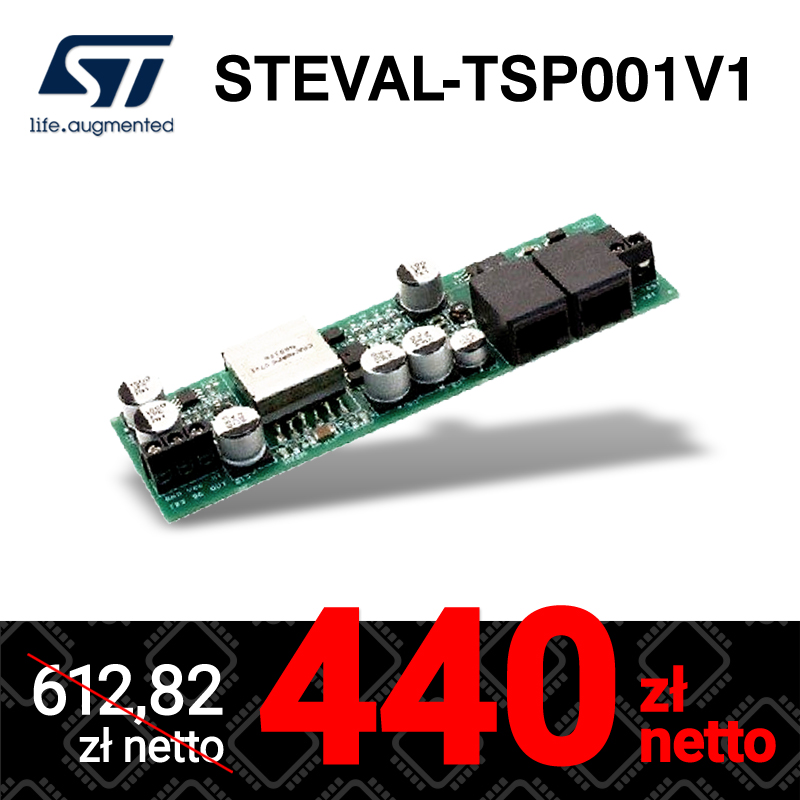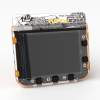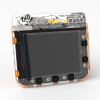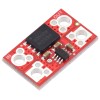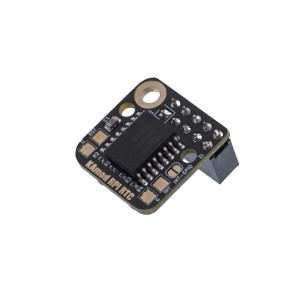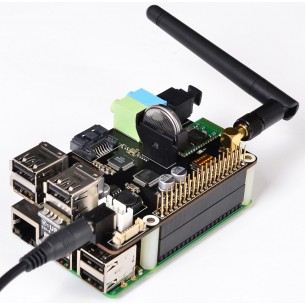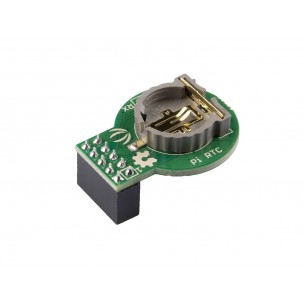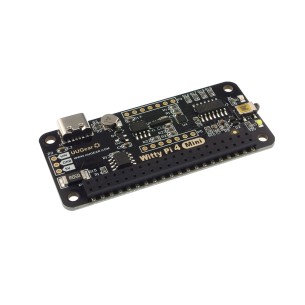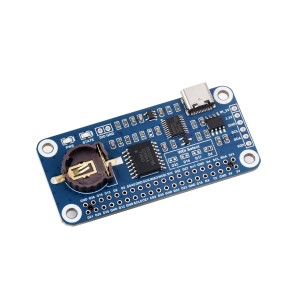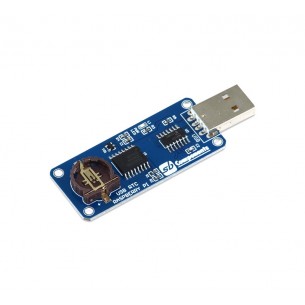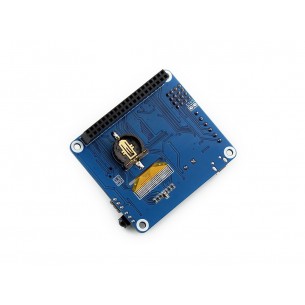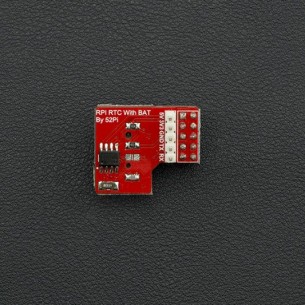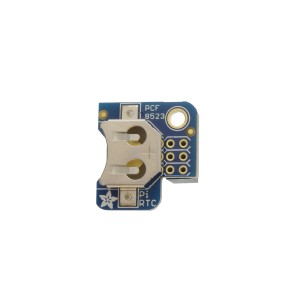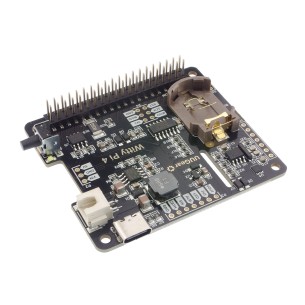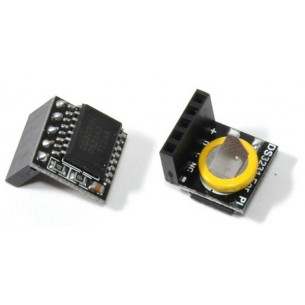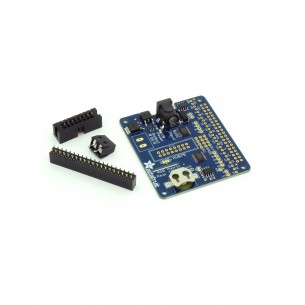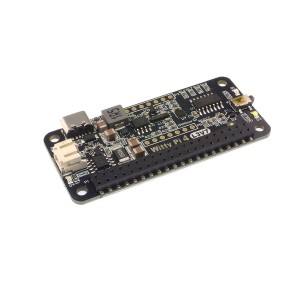Products
Categories
- Main categories
-
- 3D PRINTING
- ARDUINO
- AUTOMATION
- BOOKS
- CYBERSECURITY
- EDUCATION
- ELECTRONICS
- Cables
- Cameras and accessories
- Communication
- Conductive materials
- Connectors
- ARK connectors (Terminal Block)
- Banana connectors
- Coaxial connectors (RF)
- Connectors
- Crocodile clip
- D-Sub drawer connectors
- DC power connectors
- FFC/FPC ZIF connectors
- Goldpin connectors
- IDC connectors
- JACK connectors
- JST connectors
- Jumpers
- Memory cards slots
- Other connectors
- Pogo pin
- Quick couplers
- RJ45 connectors
- Slip ring connector
- Supports
- USB connectors
- USB PD Adapters for Laptops
- WF connectors
- Cooling
- Displays
- Electronic modules
- A/D and D/A converters
- Audio
- Barcode readers
- CAN converters
- Converters USB - UART / RS232
- Cryptographic module
- Data logger
- DDS/PLL generators
- Digital potentiometers
- Encoders
- Expanders of the I/O
- Fingerprint readers
- Galvanic isolation modules
- HMI modules
- Image and video
- JTAG accessories
- Keyboards, buttons
- LED drivers
- Memory card readers
- Memory modules
- Modules with power outputs
- Motor controllers
- Power modules
- Protection modules
- RS485 converters
- RTC modules
- Servo Controllers
- TSOP infrared receivers
- USB Converters - I2C / 1-Wire / SPI
- Voltage converters
- Gadgets
- GPS
- Intelligent clothes
- LED - diodes, displays, stripes
- Luminous wires and accessories
- Machine vission (MV)
- Memory cards and other data storages
- Passive elements
- PC accessories
- Printers
- Programatory czasowe
- Prototype boards
- Relays
- Semiconductors
- A/C converters (ADC)
- Analog systems
- Audio systems
- Bridge rectifiers
- Button
- D/A Converters (DAC)
- DDS synthesizers
- Digital circuits
- Diodes
- Drivers of motors
- DSP microprocessors
- Energy counters
- Energy harvesting
- ESD security
- IGBT drivers and bridges
- Interface systems
- LED drivers
- Logic converters
- Memory
- Microcontrollers
- Optotriacs and optocouplers
- Other
- PLL generators
- Power systems
- Programmable systems
- Resetting systems
- RF systems
- RTC systems
- Sensors
- SoC systems
- Timery
- Touch sensors
- Transistors
- Sensors
- Accelerometers
- Air humidity sensors
- Air quality sensors
- Current sensors
- Distance sensors
- Flow sensors
- Gas sensors
- Gyroscopes
- Hall sensors
- Humidity sensors
- Infrared sensors
- Laser scanner
- Light and color sensors
- Liquid level sensors
- Magnetic sensors (compasses)
- Medical sensors
- Motion sensors
- PH sensors
- Position sensors
- Pressure sensors
- Pressure sensors
- Reflection sensors
- Sensors 6DOF/9DOF/10DOF
- Sensors of liquid quality
- Temperature sensors
- Vibration sensors
- Sound transducers
- Switches and buttons
- Cables
- FPGA DEVELOPMENT KITS
- MEASURING DEVICES
- Anemometers
- Cable testers
- Distance measurement
- Electronic loads
- Generators
- Insulation resistance meters
- LCR meters
- Logic analyzers
- Measures and calipers
- Multimeters
- Network analyzers
- Oscilloscopes
- Other meters
- Panel meters
- Radiation detectors
- Sound meters
- Temperature measurement
- Testery USB
- Voltage indicator
- Wattmeters
- Weights
- MECHANICS
- MINICOMPUTERS (SBC)
- POWER
- RASPBERRY PI
- Accessories for Raspberry Pi
- Audio video cables for Raspberry Pi
- Case Raspberry Pi
- Cooling for Raspberry Pi
- Displays for Raspberry Pi
- Extension modules for Raspberry Pi
- Memory cards for Raspberry Pi
- Power for Raspberry Pi
- Raspberry Pi 3 model A+
- Raspberry Pi 3 model B
- Raspberry Pi 3 model B+
- Raspberry Pi 4 model B
- Raspberry Pi 400
- Raspberry Pi 5
- Raspberry Pi 500
- Raspberry Pi cameras
- Raspberry Pi Compute Module
- Raspberry Pi model A/ B+/2
- Raspberry Pi Pico
- Raspberry Pi prototyping
- Raspberry Pi Zero
- Raspberry Pi Zero 2 W
- RETIRED PRODUCTS
- SALE
- STARTER KITS, PROGRAMMERS, MODULES
- Atmel SAM
- Atmel Xplain
- AVR
- Coral
- DFRobot FireBeetle
- ESP32
- ESP8266
- Feather / Thing Plus
- Freedom (Kinetis)
- M5Stack
- Micro:bit
- Nordic nRF
- Other development kits
- Particle Photon
- Peripheral modules
- PIC
- Raspberry Pi RP2040
- RFID
- RISC-V
- Seeed Studio LinkIt
- Segger programmers
- SOFTWARE
- Sparkfun MicroMod
- STM32
- STM32 Discovery
- STM32 MP1
- STM32 Nucleo boards
- STM8
- Teensy
- Universal programmers
- WRTNode
- XIAO/Qt PY
- Atmel SAM
- WORKSHOP
- Adhesives for hot glue guns
- Chemistry
- Agents for securing electronics
- Cleaning and preserving agents
- Compressed air
- Conductive paints and varnishes
- Distilled water
- Etcher
- Freezing
- Gas for lighters and burners
- Isopropyl alcohol (IPA)
- Label removers
- Lubricants, oils
- Pastes and adhesives thermally conductive
- PCB cleaning products
- Thermopads - thermally conductive tapes
- CNC milling machines
- Crimping tools
- Dispensing needles
- Gluers
- Glues
- Heat-shrink tubing
- Insulation strippers
- Knives
- Laboratory power supplies
- Microscopes
- Mini drills and grindrers
- Organizers
- Personal protection (OHS)
- Power tools
- Sandpapers
- Scissors
- Soldering
- Antistatic mats and accessories (ESD)
- BGA balls
- BGA rework stations
- Brushes and ESD brushes
- Desoldering Wick
- Handles, magnifiers
- Heat guns
- Heaters and soldering irons
- Laminates
- Portable soldering irons
- Silicone Soldering Mats
- SMD Accessories
- Soldering accessories
- Soldering chemistry
- Soldering irons
- Soldering pastes
- Soldering pots
- Soldering stations
- Soldering tips
- Sponges and cleaners
- Stand for soldering irons
- Tin
- Tin extractors
- Ultrasonic cleaners
- Tapes (aluminum, kapton, copper, insulating)
- Tools
- Tweezers
- Vices
- Workshop lighting
- 3D PRINTING
New products
New products New products
Category: RTC modules
Best RTC Modules for Raspberry Pi: Precision and Reliability of Time
RTC (Real-Time Clock) modules are indispensable components in projects using Raspberry Pi. They enable precise timekeeping even in the absence of power. At Kamami store, you will find a wide range of RTC modules characterized by high accuracy, reliability, and ease of integration with various projects. RTC modules for Raspberry Pi are ideal for both professionals and hobbyists looking to enhance their projects with advanced time functions. Discover the possibilities they offer and why it's worth investing in an RTC module for your Raspberry Pi.
There are 13 products.
The DS3231 RTC module for Raspberry Pi is a high-precision, battery-powered, I2C-communicating real-time clock that provides accurate timekeeping thanks to temperature compensation and a quartz resonator
Expansion Shield X300 with RTC real time clock; audio input and output; USB hub; Bluletooth, WIFI; SATA interface. Compatible with Raspberry Pi Model B+, Pi 2 Model B and Pi 3 Model B
Module with real-time clock and CR1225 battery socket for voltage backup. It communicates via the I2C interface. Seeed Studio 103030277
Power management module with RTC clock designed for Raspberry Pi. Allows power to be cut off to the minicomputer and scripts for on/off sequences. Adafruit 5038
RTC clock module with a built-in Watchdog system dedicated to projects based on Raspberry Pi minicomputers. It is equipped with an advanced monitoring circuit with the CH32V003 chip, which allows for automatic reset in the event of system malfunction or freeze. Waveshare RTC Watchdog HAT (B)
Module with a precise clock RTC DS3231 dedicated to the Raspberry Pi. It communicates via the USB interface. SB Components 21185
The DS1307 RTC Module is a real-time clock module and a CR1220 battery backup battery. Communicates via the I2C interface. DFRobot DFR0386
Module with real time clock (RTC) PCF8523 dedicated for minicomputers Raspberry Pi. It communicates via the I2C interface. Adafruit 3386
Power management module with RTC clock designed for Raspberry Pi. Allows you to cut power to the minicomputer and script on/off sequences. Adafruit 5704
Real time clock (RTC) module dedicated to Raspberry Pi. Based on the Dallas DS3231 chip, it has a built-in backup battery
No product available!
RTC DS1307 module with clock dedicated to matrix displays with HUB75 interface. Designed for minicomputers Raspberry Pi. Adafruit 2345
No product available!
Power management module with RTC clock designed for Raspberry Pi. Allows power to be cut off to the minicomputer and scripting of on/off sequences. Dedicated for use with a 3.7V LiPo battery pack. Adafruit 5705
No product available!
Precision and Reliability
RTC modules for Raspberry Pi are designed with maximum precision and reliability in mind. Thanks to advanced technology, they provide accuracy within a few minutes per year, which is crucial in systems requiring precise time management. Additionally, they are resistant to temperature fluctuations, ensuring reliable operation in various environmental conditions.
Ease of Integration
All available RTC modules can be easily integrated with Raspberry Pi using standard communication interfaces such as I2C. This allows even beginner users to quickly set up their projects. On the Kamami website, you will find detailed descriptions and connection diagrams to facilitate the installation and configuration process. Additionally, many modules come with appropriate software and drivers, further simplifying the integration process.
Applications in Various Projects
RTC modules are used in a wide range of applications, from home automation systems to advanced industrial projects. They can be used for time monitoring in surveillance systems, lighting control, alarm systems, and IoT projects. An example application could be a smart garden irrigation system that activates at specific times of the day, regardless of potential power outages.
Choosing an RTC Module
When selecting an RTC module for Raspberry Pi, it's important to consider its technical specifications and project requirements. Key parameters include the operating temperature range, power supply voltage, and time accuracy. For projects where time precision is critical, modules with minimal time deviation should be chosen. In projects with long-term battery power, low energy consumption will also be essential.
Standards and Technical Parameters
RTC modules available on the Kamami website meet the highest quality standards. They offer various technical parameters, such as a wide range of operating temperatures, power supply voltages, and time accuracies. This allows every user to find a product perfectly suited to their needs. RTC modules are also compatible with different versions of Raspberry Pi, enhancing their versatility and facilitating integration with existing projects.
Innovation and Technology
RTC modules for Raspberry Pi are key components in projects requiring precise time tracking. They ensure reliability and accuracy, regardless of power conditions. With the wide assortment available on the Kamami website, everyone can find the right module for their project. Invest in quality and precision by choosing the best RTC modules for Raspberry Pi.

